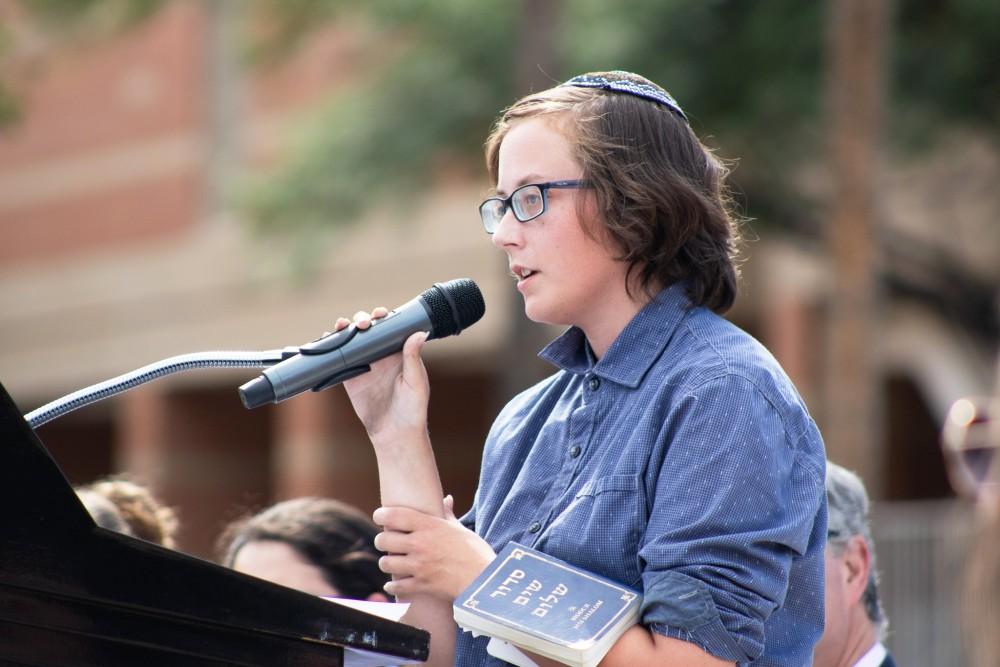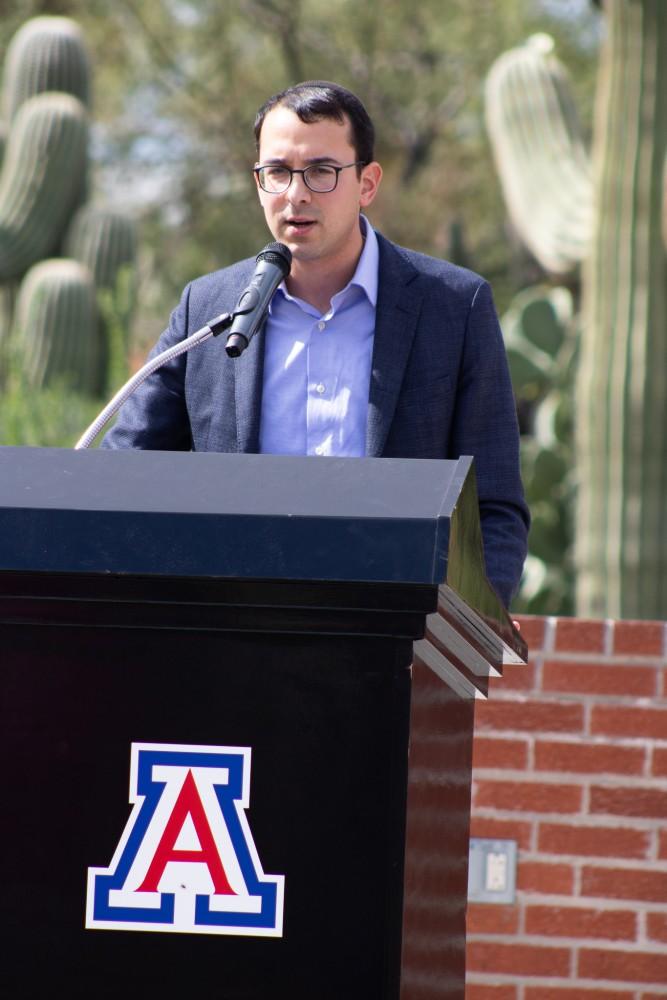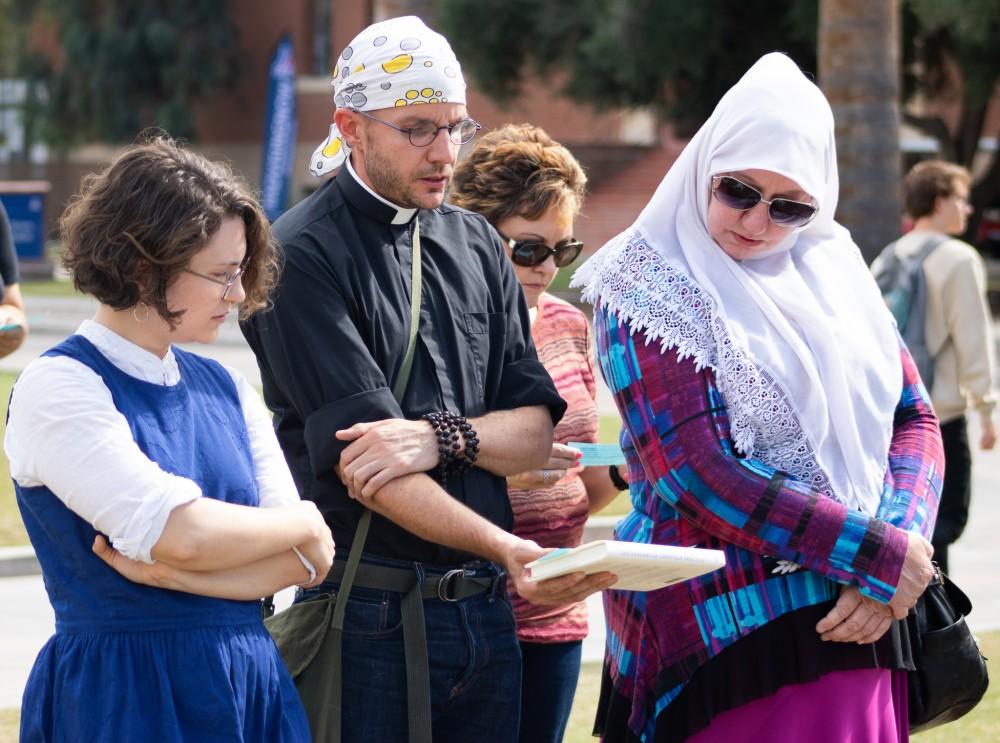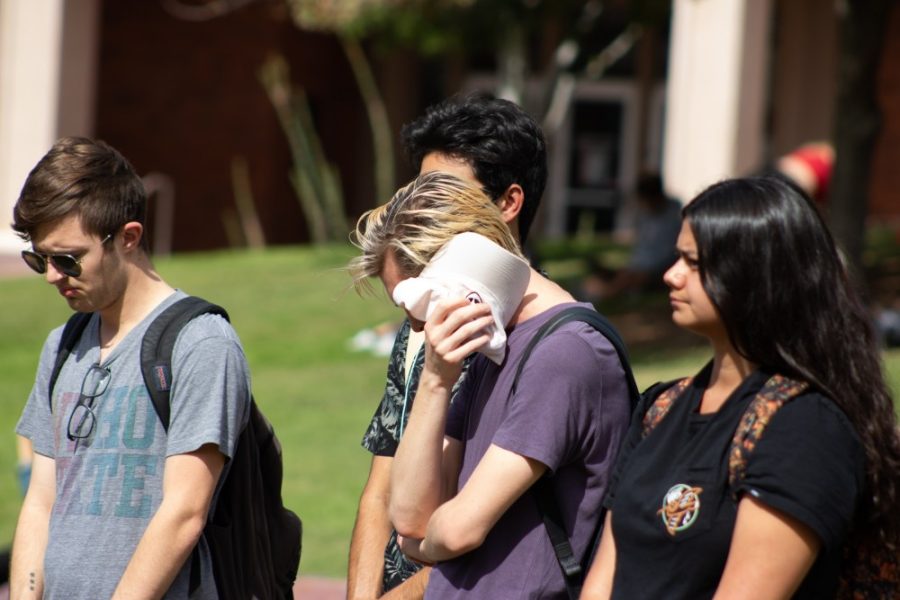People of all faiths stood in solidarity with the Pittsburg Tree of Life Synagogue after the shooting that killed 11 people on Friday, Oct. 27, honoring the victims during vigils on and off campus on Monday, Oct 29.
On campus, Hillel at the University of Arizona held a vigil on the UA Mall, where students, Hillel professionals and the Jewish Arizonans on Campus (JAC) Rabbi sang, read prayers and poems and spoke about the tragedy.
“We are reeling from the events of the past week,” Hillel Executive Director Michelle Blumenburg said to the crowd. “Fourteen pipe bombs delivered to elected officials and others. Two African Americans murdered at a grocery store in Kentucky because they were Black. And now the horror of this past Saturday. The pure hatred of these acts is beyond comprehension. Our community has faced violence before. In twelve days we will be observing the 80th anniversary of Kristallnacht, the night of broken glass, in Germany. We have seen and continue to see what happens when hatred is allowed to go unchecked.”
This event was planned in two hours by Blumenburg and her team of other Hillel professionals, who reached out to partner with JAC and Chabad.
RELATED: Kavanaugh confirmation inspires Empower Hour, support event for sexual assault survivor
For Eri Svenson, Director of Jewish Student Life at Hillel, this event was important to show Hillel’s support of Jewish students on campus.
“I would say that as Hillel professionals, what we hope to do is to create a Jewish community on campus and support Jewish students in whatever way makes sense for them at the time that they need it, so I’m thankful for the opportunity to be a Hillel professional in this moment,” Svenson said. “I wish it wasn’t necessary, but I’m glad that we can be there for the students.”

Svenson read the Mourner’s Kaddish, a prayer that is usually only read by one person and with a response by the congregation. However, Svenson invited everyone say the prayer, because, “today we are all mourners and a part of the congregation.”
Rabbi Moshe Schonbrun spoke at the vigil on anti-semitism and holding onto hope and love.
“They often say that there are two things you can have wherever you are in the world. One is Coca-cola and one is Chabad… I want to add a third thing, and that is anti-semitism. It doesn’t matter if there are Jews living there or if there aren’t, if they’re poor or they’re rich, if they’re assimilated or they’re distinct, Jews are hated.”
Schonbrun said that the way to make change is to spread kindness and hope, something that the victims of the shooting can no longer do.
“They can’t continue now, but we can. We can commit ourselves to values of kindness, to values of love and hope,” he said. “Instead of finger-pointing we can reflect and try to make change in the world because that is our ‘etz chaim’, that is our ‘tree of life.’”

Prayers read include Mi Shebeirach and Oseh Shalom, both of which were also read at the Tucson Jewish Community Center that evening.
RELATED: Creating visual conversations around gun violence
At both services, the names of the deceased were read:
David Rosenthal, 54, and Cecil Rosenthal, 59: The Rosenthals were brothers who greeted people at the door.
Bernice Simon, 84, and Sylvan Simon, 86: Husband and wife who got married at the Tree of Life Synagogue. Mrs. Simon was a retired nurse and Mr. Simon was a retired accountant.
Daniel Stein, 71: Stein once served as president of the New Light Congregation in the synagogue .
Dr. Jerry Rabinowitz, 66: Dr. Rabinowitz was one of the first doctors in the area who was willing to treat AIDs. He lost his life trying to help the wounded.
Richard Gottfried, 65: Richard was a dentist who volunteered his time and services at a local free dental clinic.
Joyce Fienberg, 75: Fienberg was a researcher at the University of Pittsburgh’s Learning Research and Development Center.
Rose Mallinger, 97: Mallinger was a former school secretary, mother and grandmother.
Melvin Wax, 88: Wax was a retired accountant and grandfather.
Irving Younger, 69: Younger was a father and grandfather, former small business owner and youth baseball coach.
A speaker at the evening vigil said, “these are not just numbers. They’re not just names. They are people.”
At the JCC on Monday night, hundreds of community members, of all faiths and ages, gathered to again pray for peace and mourn the victims.

The Tucson Muslim Community leader sang a prayer, and he, as well as leaders of the other denominations present, spoke of how they stand with the Jewish community at this time and offer their support.
For the students that were in attendance, anti-semitism is not an unfamiliar experience.
“Especially in high school it was really bad,” global studies freshman Quinn Mcveigh said. “People made a lot of really messed up jokes, but they didn’t really know what the significance of those jokes were, or people would throw pennies and tell me to go fetch them, you know, really messed up things like that.”
Another student, Maya Griswold, said “last year I was paid to play at an Easter service for one of the congregations in town and in the reverend’s sermon she said several pretty anti-semitic things, which was quite concerning because she was speaking to a large congregation. And there were two separate services because there were so many people, so she said these things on two different occasions which was probably the most concerning anti-semitism I’ve experienced.”
The students spoke on why hate crimes like the shooting in Pittsburgh keep happening.
“I think guns are the problem, also anti-semitism, but, yeah, guns… and I think a lot of people aren’t as educated as they should be on the issues that are happening around the world, especially towards Jews,” said Rachel Monheit, a freshman and nutritional sciences major.
Despite all this, there is hope for the future, as illustrated by speakers at the evening vigil.
“May humankind recognize we are all connected; there is only us,” one Rabbi said.
“That fear and hatred will be supplanted by love… I pray that we all remember our common humanity, and that love is always stronger than hate.”
– Rocky Baier, Daily Wildcat News Editor, contributed to this article.
Follow the Daily Wildcat on Twitter









